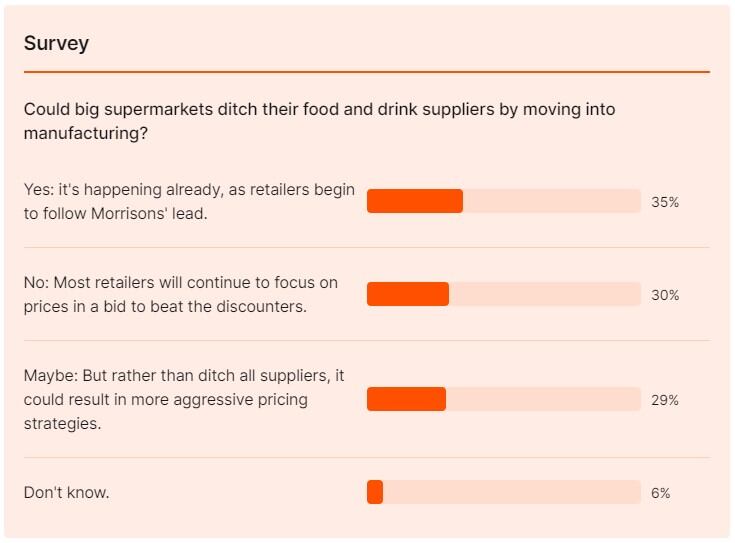More retailers could follow Morrisons’ lead in building a vertically integrated supply chain, warned business recovery specialist Begbies Traynor.
Now the UK’s second biggest fresh food manufacturer, Morrisons spend about £200M five years ago in developing its supply chain. The retailer – currently the nation’s fourth largest after Tesco, Asda and Sainsbury – owns more than 15 manufacturing facilities and 10 distribution centres.
15 manufacturing facilities
Begbies Traynor partner Julie Palmer traces retailers' renewed interest in food and drink manufacturing to the meteoric rise of limited range German discounters.
“It is clear that in order to be able to compete with the likes of discounters such as Aldi and Lidl on prices and to retain market share, the larger supermarkets have looked to exercise greater control over their supply chain and the prices they pay in order to sustain healthy margins while still driving volumes,” Palmer told FoodManufacture.co.uk.
A more vertically integrated model enabled retailers to achieve this, while offering greater autonomy in overseeing quality control.
‘Own-brands account for 54% of grocery sales’
“We see this an increasingly prevalent trend within the industry which has the potential to have considerable impact on UK supermarkets’ bottom lines, given that own-brands currently account for 54% of their grocery sales.”
Developing their own food manufacturing could enable retailers to pursue “still more aggressive pricing – signalling yet another nightmare scenario on the horizon for the UK food supply chain”, warned Palmer.
Small competitor threat
“... likely to find themselves pushed to the bottom shelf, as supermarkets focus on promoting higher margin own-manufactured products”.
Small-scale food suppliers were particularly vulnerable, said Palmer.
“The readiness of large supermarkets to acquire the stand-out supply chain players such as Forza and Cranswick will be hugely detrimental to smaller competitors which are likely to find themselves pushed to the bottom shelf, as supermarkets focus on promoting higher margin own-manufactured products.”
Meanwhile, the supermarket price war had driven many of their food suppliers to the brink of bankruptcy, warned a Begbies Traynor red alert report published earlier this week.
Do you think warnings about big retailers cutting out their food and drink suppliers are realistic? Share your views with more than 100,000 independently-audited FoodManufacture.co.uk users by taking part in our survey below.
When retailers become food manufacturers …
Morrisons has been one of the more advanced of the large-scale food retailers in terms of establishing a vertically integrated supply chain. In 2010, it spent about £200M in developing its supply chain, building upon its heritage of strong relationships with farms and food producers. The fact that Morrisons owns a significant majority of its supply chain has always been singled out as a critical differentiator.
The retailer operated more than 15 manufacturing facilities alongside 10 distribution centres and is the second largest fresh food manufacturer in the UK.
Asda has also made significant steps to develop its own supplier network in recent years. Relatively recent acquisitions such as Kober and Forza demonstrate Asda’s long-term strategy of ‘cutting out the middle man.’
- Source: Begbies Traynor

